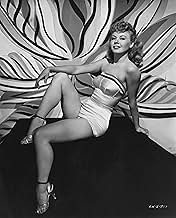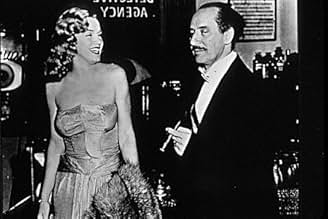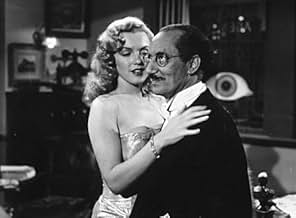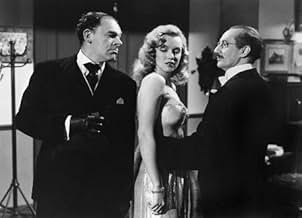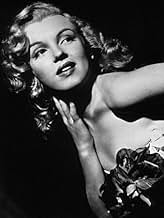VALUTAZIONE IMDb
5,8/10
3156
LA TUA VALUTAZIONE
Aggiungi una trama nella tua linguaThe Marx Brothers help young Broadway hopefuls while thwarting diamond thieves.The Marx Brothers help young Broadway hopefuls while thwarting diamond thieves.The Marx Brothers help young Broadway hopefuls while thwarting diamond thieves.
Herman Boden
- Dancer
- (non citato nei titoli originali)
Eddie Borden
- Man at Stage Door
- (non citato nei titoli originali)
Sayre Dearing
- Street Passerby
- (non citato nei titoli originali)
Joel Friend
- Dancer
- (non citato nei titoli originali)
Edward Gargan
- Cop Who Captures Harpo
- (non citato nei titoli originali)
Trama
Lo sapevi?
- QuizGroucho Marx told an anecdote - both on a '60s Today Show segment and in print - that the movie's producer asked three aspiring actresses to walk seductively past Marx. Whomever Marx decided was the best walker would play opposite him in the film. When the third girl walked past, Marx asked the producer, "How could you possibly choose anyone but that last one?" Marx had chosen Marilyn Monroe for the film.
- BlooperThe theatre's name changes from the Windsor to the Century and then back to the Windsor.
- Citazioni
Detective Sam Grunion, narrator of the story: I am the same Sam Grunion who solved the international uranium-mining swindle. Scotland Yard was baffled; the FBI was baffled. They sent for me and the case was solved immediately: I confessed.
- Versioni alternativeThe DVD version released in 2004 runs 91 minutes (despite what it says on the box) and contains several scenes not included in the 85 min. version long seen in the U.S.- 1.Harpo giving link sausages to the front man in a bull costume by threading them through a nostril in the bull head and handing the back end man a ham. 2. Groucho showing photos of himself in different disguises with Madame Egilichi and then providing voice-over narration for a scene of Chico trying to bribe Mr. Lyons by setting him up with a chorus girl. 3. Harpo being put through a washing machine by Madame Egilichi's henchmen. 4. Harpo becoming completely enveloped in smoke from the KOOL sign and ducking into an air vent which sucks away the smoke. This version is also missing a scene in which Groucho observes that the show would have been saved if Maggie had accepted the sardines Harpo gave her.
- ConnessioniFeatured in The Legend of Marilyn Monroe (1965)
- Colonne sonoreLove Happy
(1949)
by Ann Ronell
Sung during the opening credits by Marion Hutton (uncredited) with chorus and danced by Vera-Ellen (uncredited)
Dance reprise by Paul Valentine (uncredited)
Recensione in evidenza
I disagree with the put downs of this film by some viewers, for a very simple reason: I enjoyed watching it and found it funny. Sure, the plot is a little weak, but who watches Marx Brothers films for the plot? Actually, the plot is stronger than in many of their movies.
Groucho's role is certainly weak, but this may be Harpo's finest film, which showcases his beautiful comic style. Chico does fine, too. And they both deliver some wonderful musical performances.
The scene near the end on the rooftop amid the Times Square advertising signs is delightful. There seems to be an obvious element of "product placement," though I don't know whether the filmmakers got paid for this, but that all adds to the peculiar humor of the scene.
It's been a very long time since I first saw the classic Marx Brothers films, at least as an adult who could appreciate them. Back then they were funny. But I can't say they crack me up these days, as the gags have gotten old.
So it was wonderful to find this Marx Brothers film I hadn't seen, and to laugh at them again. This is a funny film. Period.
It is a bit sad knowing this was their last film, also knowing the great young comedy writers who were about to get started in live television, including Mel Brooks and Woody Allen. If only their talent could have been turned to writing more scripts for the Marx Brothers. Instead, they wrote for Sid Caesar's television shows, which in some ways were the heirs to the Marx Brothers humor.
I think I will watch Love Happy again, soon. I want to watch Harpo's performance more closely. It seems to me he was the last of the silent film comedians, in the tradition of Chaplin and Buster Keaton, whose humor was all in their body language. And this was his last great work.
Groucho's role is certainly weak, but this may be Harpo's finest film, which showcases his beautiful comic style. Chico does fine, too. And they both deliver some wonderful musical performances.
The scene near the end on the rooftop amid the Times Square advertising signs is delightful. There seems to be an obvious element of "product placement," though I don't know whether the filmmakers got paid for this, but that all adds to the peculiar humor of the scene.
It's been a very long time since I first saw the classic Marx Brothers films, at least as an adult who could appreciate them. Back then they were funny. But I can't say they crack me up these days, as the gags have gotten old.
So it was wonderful to find this Marx Brothers film I hadn't seen, and to laugh at them again. This is a funny film. Period.
It is a bit sad knowing this was their last film, also knowing the great young comedy writers who were about to get started in live television, including Mel Brooks and Woody Allen. If only their talent could have been turned to writing more scripts for the Marx Brothers. Instead, they wrote for Sid Caesar's television shows, which in some ways were the heirs to the Marx Brothers humor.
I think I will watch Love Happy again, soon. I want to watch Harpo's performance more closely. It seems to me he was the last of the silent film comedians, in the tradition of Chaplin and Buster Keaton, whose humor was all in their body language. And this was his last great work.
I più visti
Accedi per valutare e creare un elenco di titoli salvati per ottenere consigli personalizzati
- How long is Love Happy?Powered by Alexa
Dettagli
- Tempo di esecuzione1 ora 25 minuti
- Colore
- Proporzioni
- 1.37 : 1
Contribuisci a questa pagina
Suggerisci una modifica o aggiungi i contenuti mancanti

Divario superiore
By what name was Una notte sui tetti (1949) officially released in India in English?
Rispondi

